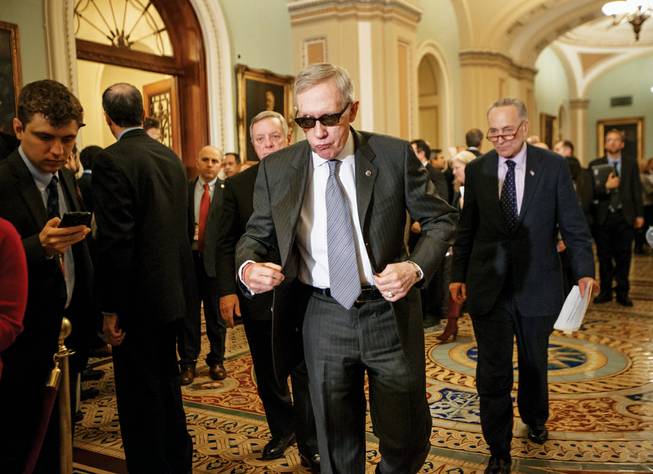
AP Photo / J. Scott Applewhite
Senate Minority Leader Harry Reid of Nev., followed by Senate Minority Whip Richard Durbin of Ill., left, and Sen. Charles Schumer, D-N.Y., right, arrives for a news conference on Capitol Hill in Washington, Tuesday, Feb. 24, 2015.
Monday, June 22, 2015 | 2 a.m.
Senate Minority Leader Harry Reid says he has no plans for what he’ll do after he retires from Congress in January 2017.
“I don’t know what I’m doing to do,” Reid said. “I’m not really worried much about it.”
With 30 years of experience as a U.S. senator, eight of them as Senate majority leader, Reid has options. If he follows in the footsteps of his former colleagues, these are some of the moves he might consider.
■ Become a star
After retiring from the Senate to run for president — something not on Reid’s radar — Bob Dole found a new platform doing commercials for companies such as Viagra, Visa and Dunkin’ Donuts. He also had stints on “Larry King Live” and “60 Minutes.”
■ Promote an issue
This one’s a natural fit for politicians.
Consider former Senate Majority Leader Tom Daschle, a Democrat, who started a health advocacy group with his former rival, onetime Republican Senate Majority Leader Bill Frist. Frist, a former doctor, and Daschle co-chaired ONE VOTE ’08 to bring global health and poverty issues to the forefront of the 2008 presidential campaign.
Probably the greatest example of bipartisan advocacy by Senate leaders post-Congress is the creation of the nonprofit Bipartisan Policy Center. The think tank was founded in 2007 by former Senate majority leaders Howard Baker, Bob Dole, George Mitchell and Daschle.
■ Go overseas
After serving stateside, some Senate leaders hop on a plane to see what they can do abroad.
George Mitchell, who ran the Senate from 1991 to 1995, went to Ireland at the request of President Bill Clinton to negotiate peace talks. He also recently served as a special peace envoy to the Middle East.
After Howard Baker retired from the Senate in 1985, he served as a presidential foreign adviser and most recently served as U.S. ambassador to Japan.
■ Get mired in controversy
It’s likely something they didn’t set out to do, but many former Senate leaders have gotten into trouble or been accused of wrongdoing after leaving Congress.
Frist left the Senate in 2006 mired in an insider trading investigation into his well-timed sale of stock in a family-owned hospital chain. It ended in 2007 with no charges.
Daschle tried to re-enter the public spotlight in 2009 when President Barack Obama nominated him to serve as secretary of health and human services. But revelations he failed to pay more than $100,000 in back taxes forced him to withdraw even before he got the job.
■ Lobby, lobby, lobby
The vast majority of retired Senate leaders turn from lawmaker to lobbyist.
Former Republican majority leader Trent Lott announced in 2007 he would retire from the Senate in the middle of his term — months before a new ethics law took effect that required lawmakers to wait two years instead of one before lobbying Congress. A few months after he left Congress, Lott co-founded a public policy firm.
After Daschle lost re-election in 2004, he was recruited by Dole to a lobbying firm and an annual salary estimated at $4 million.
I’d rather go to Singapore and have them beat me with whips than become a lobbyist,” Reid told The New York Times. "I don’t need a full-time job.” he said.
Or if Reid were to change his mind ...
■ Stay in the Senate
Democrat Robert Byrd resigned as Senate majority leader in 1989 to serve as chairman of the Senate appropriations committee, a powerful post albeit a step down from leader. Byrd died in office in 2010 after serving in the U.S. Senate longer than anyone else in history — 51 years.
The Rules
Former U.S. senators who want to lobby their former colleagues in Congress must endure a two-year cooling-off period before starting work. The law aims to limit lawmakers’ ability to cash in on inside knowledge.
But the Center for Responsive Politics says the law is “more spaghetti than steel.” At the start of this year’s Congress, a handful of former lawmakers and their staffs, still in the midst of the cooling-off period, served in public policy or government affairs jobs. They just weren’t called lobbyists.

Join the Discussion:
Check this out for a full explanation of our conversion to the LiveFyre commenting system and instructions on how to sign up for an account.
Full comments policy